Deformation Of Bars Under Bending Torsion
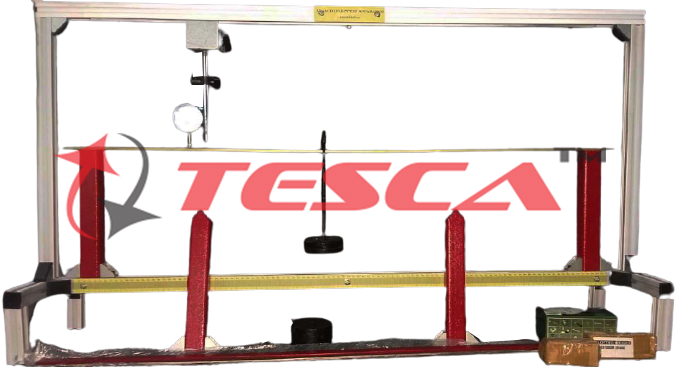
Order Code: 32133
Category: Strength of Materials Lab
Features Elastic deformation of statically determinate or indeterminate beams under bending load1 Elastic torsion of round bars under torque1 Influence of material, cross-section, and clamping length on deformation ...
SPECIFICATION
Features
- Elastic deformation of statically determinate or indeterminate beams under bending load1
- Elastic torsion of round bars under torque1
- Influence of material, cross-section, and clamping length on deformation
Bending and torsion are typical loads to which components are subjected. The resultant stresses and deformations can lead to the failure of the component. A number of different factors play a role in this, including the material, the cross-section of the bar, the clamping length, and the method of bearing support.
Tesca Deformation of Bars under Bending or Torsion investigates the influence of these factors on the deformation of a bar under bending load or torque. A set of test bars has been assembled so as to permit direct comparison of measurement results. The bar under investigation is fixed to two movable support blocks and loaded down by a weight. A dial gauge records the resulting deformation. The support blocks include clamping chucks to hold the torsion bars and bearings for the bars in the bend test. The bearings offer a range of clamping options, enabling statically determinate or indeterminate bearing supports to be investigated.
The torque is applied by a device mounted on a support block. The point of load application to generate the bending moment is adjustable.
The various elements of the experiment are clearly laid-out and housed securely in a storage system. The complete test set-up is arranged on the frame.
The well-structured instructional material sets out the fundamentals and provides a step-by-step guide through the experiments.
Specifications
Elastic deformation of bars under bending or torsion
Bending tests with statically determinate and indeterminate systems
Torsion tests with a statically determinate system
Supports in the bending test may be clamped or free
2 adjustable blocks with clamping chuck for torsion tests and supports for bending tests
Set of weights to generate the bending or torque
Dial gauge with bracket
Storage system to house the components
Technical Specifications:
17 bars for bending tests
- Material: aluminum, steel, brass, copper
- Height with LxW 510x20mm: h=3...10mm
- Width with LxH 510x5mm: w=10...30mm
- Length with WxH 20x4mm: l=210...510mm
- LxWxH: 20x4x510mm (aluminum, steel, brass, copper)
- LxWxH: 10x10x510mm (aluminium)
22 torsion bars
- Material: aluminium, steel, brass, copper
- Length with d=10mm: 50...640mm (aluminium)
- DxL: 10x50mm/10x340mm (aluminium, steel, copper, brass)
- Diameter with L=50/340mm: d=5...12mm (steel)
Dial gauge: 0...10mm, graduations: 0,01mm
Tape measure, graduations: 0,01m
Weights
- 1x 1N (hanger)
- 1x 1N, 1x 4N, 1X 5N, 1x 9N
Experiments
Bending tests
- Determination of the modulus of elasticity
- Statically determinate systems
Beam mounted on 2 supports; cantilever beam
- Statically indeterminate systems
Dual-span beam
- Deformation of a beam dependent on Material
Geometry (section width, height, and length)
Type of support and length of the span
- Formulation of proportional relationships for the deformation Torsion experiments
- Determination of the shear modulus of various materials
- The angle of twist dependent on
Clamping length
Bar diameter
- Formulation of proportional relationships for the angle of twist
Scope of Delivery:
1 frame
2 bearing blocks
1 device to generate the torque
17 bars for bending test
22 torsion bars
1 dial gauge with bracket, 1 tape measure
1 set of weights including hanger
2 hexagon socket wrenches
1 storage system
1 set of instructional material

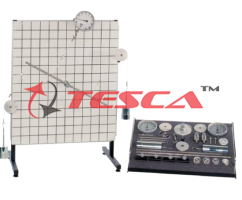
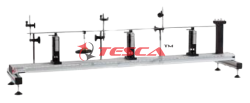
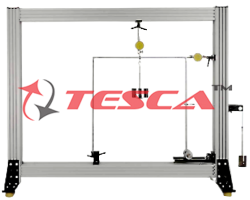
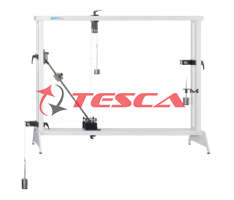
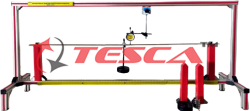
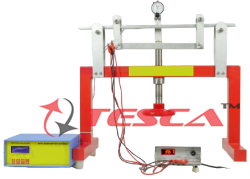
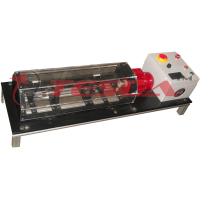
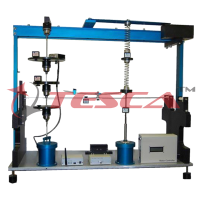


 91-9829132777
91-9829132777